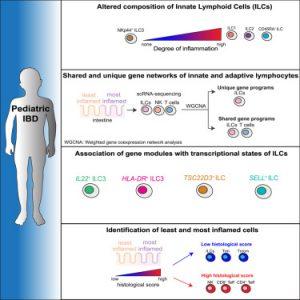A recent study has successfully mapped the immune system within the gastrointestinal tract of children who suffer from inflammatory bowel disease (IBD) (Figure 1). This research aims to address the limited knowledge we currently have about how the immune system functions in children with IBD and how it differs from adults.
It is crucial to identify biomarkers that can predict treatment response and aid in the development of new treatment methods, as approximately 40 percent of patients, both children and adults, do not respond to existing treatments. Although inflammatory bowel disease, including conditions like Crohn’s disease and ulcerative colitis, currently lacks a cure and only has symptomatic treatments available, this study seeks to meet the clinical demand for understanding the underlying causes and processes occurring in the gut of children with IBD.
The study’s findings revealed that children with intestinal inflammation had higher levels of pro-inflammatory cell types, such as innate lymphoid cells type 1 (ILC1) and cytotoxic cells like T cells and NK cells. Conversely, a specific subtype of protective cells known as type 3 innate lymphoid cells (ILC3) and tissue-resident T cells were found to be less abundant in the intestinal mucosa of children with IBD. This discovery opens up possibilities for future research to develop personalized treatments that can target these specific immune cell types.
Overall, studies like this provide hope for the future by shedding light on the intricacies of the immune system in IBD and offering potential for tailored treatments that address the unique needs of each individual.
Journal article: Kokkinou, E., et al., 2023. The single-cell transcriptional landscape of innate and adaptive lymphocytes in pediatric-onset colitis. Cell Reports Medicine.
Summary by Stefan Botha











